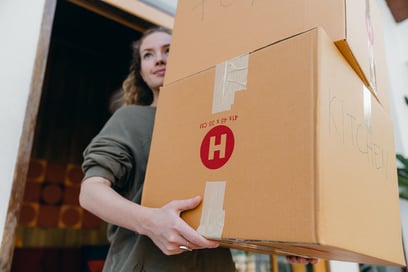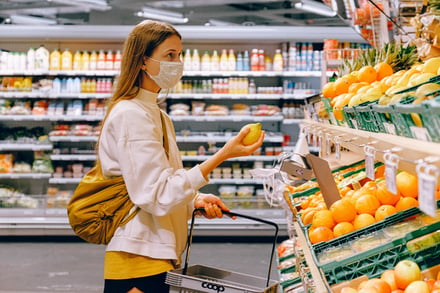Learn how what was missing turned into a collaboration to help our community.
Throughout the coronavirus pandemic, access to food has been top of mind for individuals and families across Eastern Iowa. Several nonprofit organizations have stepped up to put together food boxes and other materials for those who need them most, but one organization has been focused on providing culturally appropriate food for the refugee and immigrant community.
Since the early stages of the pandemic, the Catherine McAuley Center (CMC)—one of United Way of East Central Iowa (UWECI)’s funded partners—has been running a food delivery project. This project provides boxes of culturally appropriate food to members of the refugee and immigrant community in East Central Iowa. When Sara Zejnic, Director of Refugee & Immigrant Services, initially heard of this need, she knew something had to be done.
United Way of East Central Iowa (UWECI)’s funded partners—has been running a food delivery project. This project provides boxes of culturally appropriate food to members of the refugee and immigrant community in East Central Iowa. When Sara Zejnic, Director of Refugee & Immigrant Services, initially heard of this need, she knew something had to be done.
“I was participating in the LAP-AID calls, and access to food was a topic that came up frequently,” Zejnic said. “United Way served as a connector for us and were in the best position to connect us with food pantries and other individuals to get the ball rolling.”
In addition to connecting with UWECI, Zejnic connected with Bridget Williams from Matthew 25, who was running a food delivery project for homebound seniors in Linn County. From there, CMC’s Volunteer & Outreach Coordinator, Katie Splean, took the project and ran with it.
“We were approached to supplement the general area for the refugee population, took the idea, and made it happen,” Splean said.
Having culturally appropriate food for individuals is important on many levels. By providing specific food, it gives people a sense of comfort in staying home, as well as encourages them to stay there and make minimal trips to get supplies from a store or pantry. Obtaining these items can be a struggle for some individuals, so having this project is extremely helpful.
CMC obtained boxes from other food pantries containing meat and produce items, to which they could add the other culturally specific food. Additionally, they were able to provide items for cleaning and hygiene needs, such as masks, hand sanitizer, toilet paper, and paper towels. Translated information about COVID-19 was also included in these boxes. CMC also requested other necessities such as laundry detergent, dish soap, and diapers, which they were able to purchase and distribute.
The project has served more than 200 individuals since the start of May, and 250 total individuals since March. Once public transportation started operations again, the project saw less clients. However, the project is happening and volunteers are available to deliver boxes on an on-call basis.
individuals since March. Once public transportation started operations again, the project saw less clients. However, the project is happening and volunteers are available to deliver boxes on an on-call basis.
While delivering food boxes, both Zejnic and Splean have seen how their work has made a difference. Zejnic remembers delivering to one home specifically. “They were so happy to be able to clean their home and feel comfortable staying in. It was a really rewarding experience, knowing that because this was available, they were able to safely stay at home,” she said.
Splean recalled seeing a familiar face while delivering food boxes one day. A student, who utilizes other services at CMC, got connected to the food delivery project and signed up to receive a food box. Splean and the student recognized each other.
“It [the interaction] felt as though she knew CMC was looking out for her during the pandemic,” Splean said. “It was a full circle moment for me.”
Anyone willing to help with the project or other volunteer needs at CMC can send an email to the organization or visit their website, Splean said.
“I like to get to know individuals and how their skills can help not only our organization, but the community as a whole,” Splean added.
This project is one of many that happens thanks to the connecting power of UWECI in communities we serve.

